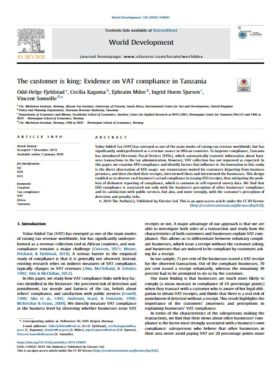World Development 128
Value Added Tax (VAT) has emerged as one of the main modes of raising tax revenue worldwide, but has significantly underperformed as a revenue source in African countries. To improve compliance, Tanzania has introduced Electronic Fiscal Devices (EFDs), which automatically transmit information about business transactions to the tax administration. However, VAT collection has not improved as expected. In this paper, we examine EFD compliance and identify factors that influence it. An innovation in this study is the direct observation of EFD usage: our enumerators waited for customers departing from business premises, and then checked their receipts, interviewed them and interviewed the businesses. This design enabled us to observe each business’s actual compliance in issuing EFD receipts, thus mitigating the problem of dishonest reporting of compliance, which is common in self-reported survey data. We find that EFD compliance is associated not only with the business’s perception of other businesses’ compliance and its satisfaction with public services, but also, and more strongly, with the customer’s perception of detection and penalty risks.

